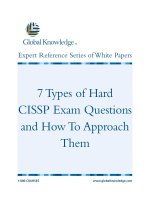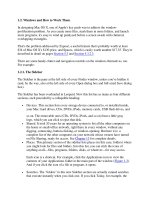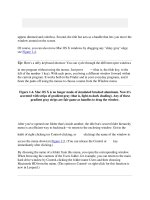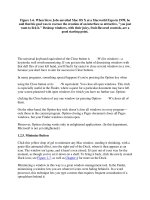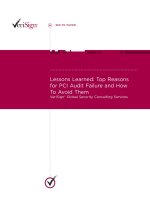common mistakes at ielts and how to avoid them advanced paperback sample pages
Bạn đang xem bản rút gọn của tài liệu. Xem và tải ngay bản đầy đủ của tài liệu tại đây (512 KB, 6 trang )
Cambridge University Press
978-0-521-69247-2 - Common Mistakes at IELTS Advanced: And how to Avoid them
Julie Moore
Excerpt
More information
1
Articles: the before general concepts
1 Tick the correct sentence in each pair.
1 a
b
2 a
b
Many people are worried about the bad effects of mobiles on brain.
Many people are worried about the bad effects of mobiles on the brain.
We need to look at factors such as the availability of health care.
We need to look at factors such as availability of health care.
We use the before nouns which describe a general type of thing rather than a specific
example of that thing:
These are problems for students living away from the family.
We don’t know the effects of such chemicals on the body.
The role of the student at university level varies greatly from country to country.
Most of our business is carried out over the telephone.
The is also used before abstract nouns which describe a situation, a quality, a process
or a change. These words are often followed by of something:
There is a problem with the availability of clean water in some villages.
The distribution of income is uneven in most countries.
On the whole, the standard of living is better in urban areas.
Many residents complained about the frequency of bus services.
This advance was brought about by the development of antibiotics.
He made a number of recommendations for the improvement of staff training.
We use the development/improvement, etc. of something to describe a general
process of change, but developments/improvements, etc. in something to describe
specific changes:
We try to keep up-to-date with new developments in information technology.
2 Correct the mistake below.
Doctors always stress
importance of a balanced diet.
Doctors always stress ........................................ .
3 Are these sentences right or wrong? Correct those containing mistakes.
1
2
3
4
5
6
7
8
A diet high in cholesterol is bad for heart.
The introduction of computerised systems led to an increase in unemployment.
We all benefit from development of new technologies.
We were unhappy about quality of the food available.
Last year the airline saw a 20% improvement in delays.
There have been changes in the relationship between the teacher and the student.
Rates vary depending on standard of accommodation you choose.
She focused on the role of a family in a child’s education.
5
© Cambridge University Press
www.cambridge.org
Cambridge University Press
978-0-521-69247-2 - Common Mistakes at IELTS Advanced: And how to Avoid them
Julie Moore
Excerpt
More information
2
Articles: a/an before noun phrases
1 Tick the correct sentence in each pair.
1 a
b
2 a
b
The company has captured a significant share of the market.
The company has captured significant share of the market.
I think they are also right to certain extent.
I think they are also right to a certain extent.
Don’t forget to include a/an before an adjective + singular noun combination:
He clearly has a good understanding of the issues.
Many students have a part-time job while studying.
Notice the position of adverbs (very, really, quite, etc.) in these phrases:
We have a very high percentage of women working in senior government posts.
There was a really good atmosphere.
In my view, this is quite a strong argument.
Some common noun phrases to be careful with:
• to a certain extent/degree: I agree with you to a certain degree.
• a wide range/variety: We have a wide range of books to choose from.
• a(n) large/small/equal number/amount: an equal number of men and women
• a high/large/small/greater proportion/percentage: a small proportion of patients
• a long time: I haven’t seen her for a long time.
2 Correct the mistake below.
All competitors should have
equal chance of winning.
All competitors should ........................................ .
3 Use the words below in the same order to form correct sentences, adding any
necessary articles or prepositions.
1
2
3
4
5
6
7
8
Only / small / number / troublemakers / were / responsible for / problems.
Computers / play / very / important / role / education / nowadays.
She / can’t / afford to / study / full-time / basis.
Teenagers / should be / allowed / greater / degree / freedom.
They / have / slightly / different / approach to / studying.
We / had / one-week / intensive / training / course.
There / has been / gradual / increase / number / thefts.
They / offer / quite / wide / variety / courses.
6
© Cambridge University Press
www.cambridge.org
Cambridge University Press
978-0-521-69247-2 - Common Mistakes at IELTS Advanced: And how to Avoid them
Julie Moore
Excerpt
More information
3
When do I use capital letters?
1 Tick the correct sentence in each pair.
1 a
b
2 a
b
She explained that Thai food often requires a lot of ingredients.
She explained that thai food often requires a lot of ingredients.
Sixty percent of students enrolled at the university are male.
Sixty percent of students enrolled at the University are male.
Capital letters are always used for nouns in the following groups:
• countries: Germany, the United States, Britain, the Czech Republic, etc.
• towns, cities, states and regions: Tokyo, Paris, Texas, New South Wales, etc.
• nationalities, ethnic groups and religions – referring to people, languages or things
from a country, region or culture:
Can you speak Chinese?
You can hear he’s South African from his accent.
a Buddhist temple
I’d like to learn more about Asian culture.
• months and days of the week: October, 9th April, Tuesday, Sunday, etc.
Capital letters are not used for the seasons: spring, summer, autumn, winter
• names of organisations and institutions: the United Nations, the National Museum
Where a word like museum, university, station or hospital is part of the name of an
institution, it has a capital letter: Harvard University, Karachi Station, Rome Airport
However, when these words are not part of a name, they do not have a capital letter:
They built a new 100-bed hospital in the provincial capital.
He first joined the company in 2003.
Also remember: the Earth (but not the World), the Third World/a Third World
country, AIDS, CD/DVD (plural CDs/DVDs).
2 Correct the mistake below.
I’m arriving at ........................................
3 Add the correct punctuation, including capital letters, in the sentences below.
1
2
3
4
5
6
7
8
visitors to china should remember not to give a clock as a present
these customs are common in muslim countries such as saudi arabia
she started work for microsoft in july 2005
i went to university in geneva in switzerland
we took a taxi from york station to the royal york hotel in the city centre
this is a photo of me on wall street when we visited new york last summer
the red cross works throughout the world not just in third world countries
she hopes to compete for france in the european championships in august
7
© Cambridge University Press
www.cambridge.org
Cambridge University Press
978-0-521-69247-2 - Common Mistakes at IELTS Advanced: And how to Avoid them
Julie Moore
Excerpt
More information
TEST
TEST 1
1 Underline the correct article: a/an, the or – (no article).
1 This test measures a/the/– concentration of acid in a/the/– stomach.
2 It took an/the/– incredibly long time for the results to be announced.
3 There have been an/the/– improvements in a/the/– quality as well as an/the/–
efficiency.
4 A/The/– high percentage of businesses fail in the first year.
5 The study found that a/the/– significant number of homes had two cars.
6 This shows a/the/– sharp decline in a/the/– proportion of aid allocated to health.
7 He studied the role of an/the/– extended family in caring for older people.
8 These reforms have succeeded to a/the/– certain extent.
9 All children should receive a/the/– basic education.
10 The HR department deals with a/the/– recruitment of new staff.
11 What is a/the/– significance of these figures?
12 She has an/the/– excellent communication skills.
2 The text below contains a number of mistakes with articles (the, a/an) and capital
letters. Find the mistakes and correct them.
The UN High Commissioner for Refugees (UNHCR) was established on
14 december, 1950. It was set up to protect refugees throughout World
and to help in resolution of refugee problems. It has its headquarters in
geneva, switzerland, but the Organisation has a staff of around 6,540 in
116 countries. Its main aim is to safeguard rights and well-being of
refugees. Large proportion of the 20.8 million people which UNHCR
helps are in third world, especially in countries in africa and asia. More
than a quarter of the world’s refugees, however, are in europe and united
states, many of them seeking asylum.
8
© Cambridge University Press
www.cambridge.org
Cambridge University Press
978-0-521-69247-2 - Common Mistakes at IELTS Advanced: And how to Avoid them
Julie Moore
Excerpt
More information
3 Put the words below together to make three complete texts, adding any
punctuation and extra words (such as articles or prepositions) necessary.
1 odile is french she was born lyon 21 september 1968 she
moved britain 20 years ago and now has british
citizenship she speaks english fluently but she still has
quite strong french accent
2 corinne lives with her husband steve near melbourne
australia steve is australian but corinne has german
mother and american father she was born united states
and met steve while they were both working europe
3 andré is travel photographer he lives switzerland but he
spends large part of the year travelling around world last
summer he went on long trip south america to photograph
ancient inca temples
4 Rewrite the sentences below using the word given and making any changes
necessary to keep the meaning the same.
1 The council wants to encourage new businesses to develop.
development .......................................................................................................................................
2 His main role is to assess how good the service is for customers.
quality ..................................................................................................................................................
3 There has been an increase in the amount of goods transported by road.
transportation ...................................................................................................................................
4 Whether mothers return to work often depends on whether childcare is available.
availability ..........................................................................................................................................
5 Many of the changes are due to the fact that tourism has grown in the region.
growth ..................................................................................................................................................
9
© Cambridge University Press
www.cambridge.org
Cambridge University Press
978-0-521-69247-2 - Common Mistakes at IELTS Advanced: And how to Avoid them
Julie Moore
Excerpt
More information
4
When do I use when, if and whether?
1 Tick the correct sentence in each pair.
1 a
b
2 a
b
Many people would stop using their cars when public transport was better.
Many people would stop using their cars if public transport was better.
We discussed if universities should charge tuition fees.
We discussed whether universities should charge tuition fees.
We use when to talk about an event or situation that we believe will happen:
I plan to go travelling when I finish my studies. (I expect to finish.)
Give me a call when you arrive at the airport. (We expect the person to arrive.)
We use if to talk about a hypothetical possibility, especially in conditional sentences:
I would only go home if it was a real emergency.
Give me a call if there are any problems. (Problems are only a possibility.)
We also use if in certain polite requests:
I would appreciate it if / would be grateful if you could call me back.
Would you mind if I asked you a few questions about the accident?
We use whether where we are considering two possibilities:
I don’t know whether to have the beef or the lamb.
Many students have to get part-time jobs whether or not they want to.
We use whether after certain verbs (and nouns) which involve considering two options:
They had a meeting to discuss whether they should take further action.
The current debate is whether immigrants should adopt local customs.
2 Correct the mistake below.
The big question is that I
should call him or wait for
him to call me.
The big question is ........................................ .
3 Complete the sentences using when, if or whether.
1
2
3
4
5
6
7
8
I’d suggest checking ........................... the person has a permit or not.
We’ll probably move to a smaller house ........................... the children leave home.
Why don’t you come in the summer ........................... the weather’s better?
Some people have questioned ........................... it’s useful or just a waste of money.
It would be helpful ........................... they could give us a breakdown of the marks.
They carried out tests to determine ........................... or not he had the disease.
I’m sure they’d be really pleased ........................... you were able to come.
You will need to show your driving licence ........................... you collect the hire car.
10
© Cambridge University Press
www.cambridge.org




